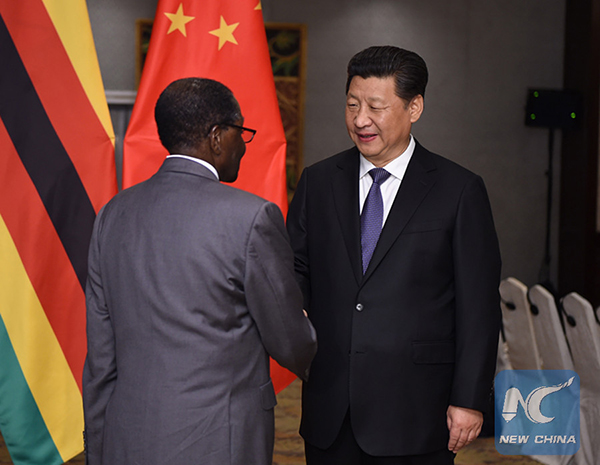Zimbabwe sees increasing role for RMB to maintain investment
By Li Lianxing (chinadaily.com.cn) Updated: 2015-12-01 17:11
 |
|
File photo of Chinese President Xi Jinping (R) meeting with Zimbabwean President Robert Mugabe in Jakarta, capital of Indonesia, April 23, 2015. [Photo/Xinhua] |
Industrialization is vital to the country's two key sectors, agriculture and mining industry, he says.
"Weather and land conditions in our country are suitable for many crops, and we have a strong agriculture sector. But we need to ask if we will continue to trade them as primary products or you process them into finished products. So industrialization is also a good opportunity for agriculture."
Once the products are processed locally in Zimbabwe, getting them to local and international markets is easy given the country's geographic advantage. That includes linking the countries that are richest in mineral resources, he says.
"Ordinarily, people would see being inland as a disadvantage, but I see it as an advantage because we are there as a key place linking Africa in all directions. Southern Africa in general is also in quite a strategic position in the continent with rich resources, having 60 to 70 percent of the world's mineral resources. We are also a neighbor of the most sophisticated economy in Africa - South Africa."
More than 50 kinds of minerals can be found in Zimbabwe, some in abundance. Its neighbors, such as the Democratic Republic of Congo, Mozambique and Zambia are all richly endowed with natural resources, including nickel, coal, diamonds, gas and copper, he says.
More importantly, with deepening regional integration, the country is benefiting from its membership of different regional organizations, including the Southern African Development Community, the Eastern African Community and the Common Market for Eastern and Southern Africa, which has a total population of 650 million, giving it huge market potential.
For China and Zimbabwe to work more closely together, Chikawa says skills transfer is crucial. China should bring more technologies and skills to the country and educate locals. A whole industry chain can be established once human capacity and natural resources can be perfectly matched.
The country wants to commit itself to establishing a sustainable investment environment for foreign investors, many of whom have concerns over issues such as the rule of law, he says.
"We also need to engage our partners in a sincere and faithful exchange to see what fields need attention and clarification."
A stagnant financial market in the country also worries many foreign investors, but Chikawa says the government is determined to attract and protect foreign investment.
"We have institutions to guarantee and protect foreign investment, as we know fair money will benefit both the investor and our country. So you can repatriate 100 percent of your investment if you decide not to continue your business in our country."




